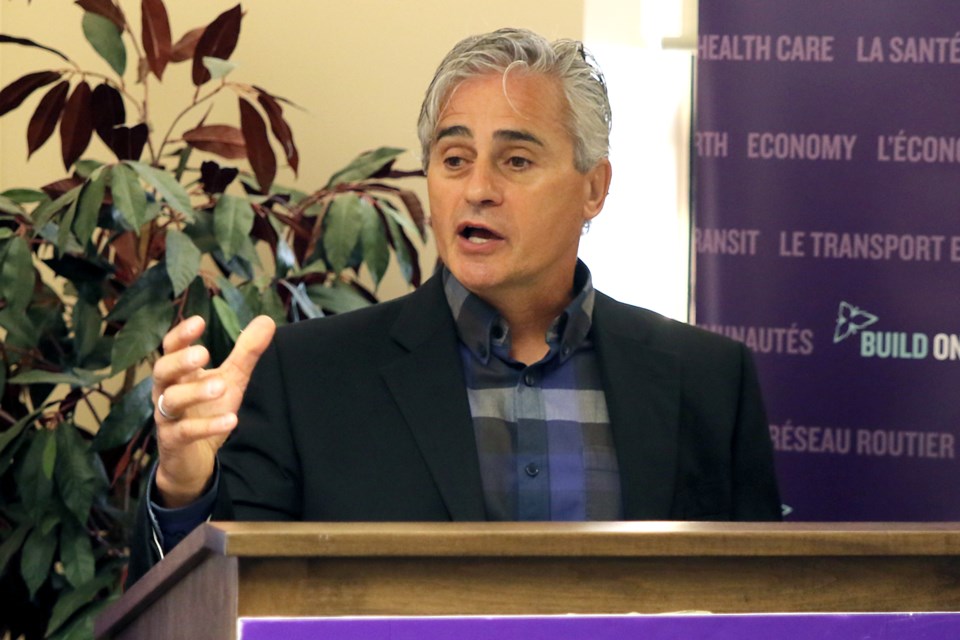Minister on Municipal of Municipal Affairs Bill Mauro says Northwestern Ontario residents – particularly those who live in designated rural areas – can expect a hefty decrease in their monthly hydro bills.
Mauro, reacting to Monday’s Throne Speech read by Lieut.-Gov. Elizabeth Dowdeswell, said all homeowners can look forward to an eight per cent reduction, the equivalent of the provincial portion of the harmonized sales tax.
But rural customers could see their bills drop even further, he said.
“That, along with the HST rebate, will represent about a 20 per cent reduction in their monthly bill,” Mauro said, adding the program applies to homeowners living in low density areas serviced by Hydro One, such as Oliver Paipoonge, designated R2 by the province.
Mauro acknowledged out-of-control electricity prices have been a sore spot for many residents across Ontario, who have seen their bills skyrocket as the province closed coal-fired generating stations, upgraded transmission grids and embarked on a green energy program.
Mauro said contrary to what political critics have said, the continuous hikes were essentially unavoidable.
“Having said that, we recognize it’s becoming a significant pocketbook issue for our constituents in many parts, if not all the province,” Mauro said, reached by phone at Queen’s Park.
However, Thunder Bay Chamber of Commerce president Charla Robinson said the public shouldn't forget new cap-and-trade policies being introduced will increase rates on Jan. 1, 2017, which might only be offset by the reductions announced on Monday.
"We know on Jan. 1 our electricity rates are automatically going up. This will maybe offset that increase for some and for some maybe it won't," Robinson said. "There are still a lot of questions surrounding how cap-and-trade will impact on a business-to-business and resident-to-resident level. We need more details on what that's going to mean for the local economy."
Minister of Northern Development and Mines Michael Gravelle said it’s encouraging the premier made reference to the Ring of Fire in her speech, which she called a reboot for her government after seeking permission late last week to prorogue the legislature.
Wynne said Ontario will continue to invest in all regions of the province, “including to help unlock the tremendous mineral potential of Northern Ontario.”
Gravelle, whose government maintains its $1-billion commitment to the mining project, said Wynne’s comments reaffirm her interest in seeing development occur sooner, rather than later.
“We’re going to continue to work hard to see it move forward,” Gravelle said in an interview with CKPR Radio.
No timeline was given.
Wynne’s speech also included a promise to spend $160 billion over five years on 5,000 kilometres of highway and bridge improvements. About half that total, or 2,400 kilometres, are scheduled for Northern Ontario.
Mauro said continued work on the twinning of the Trans Canada between Thunder Bay and Nipigon will be a large portion of the work done in this region, but he added he wants to see work begin on upgrades to the Thunder Bay Expressway between Arthur and Balsam streets.
The province has already spent $4 million on an environmental assessment for the project.
“That is close to being concluded and we will be in a position soon to begin the process of identifying funding and beginning to plan for needed improvements as I seem them on that stretch of highway – whether that’s four-laning and/or interchange improvements that may be grade separations,” Mauro said.
The veteran minister said he’s also encouraged by the commitment to light rail in southern Ontario, which he suspects will almost certainly have an impact on Thunder Bay’s Bombardier manufacturing plant.
Other highlights from the throne speech included a promise to increase child-care spaces by 100,000 over the next five years and a commitment to extend the electricity grid to more Aboriginal communities, provide First Nations with access to clean drinking water and to create culturally appropriate education systems and public services.
